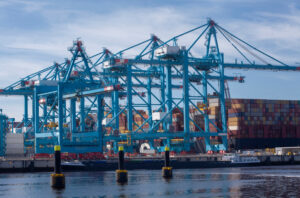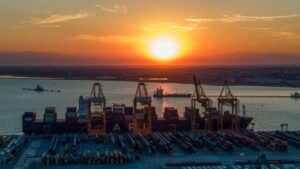German ports have continued to suffer from growing congestion as the rest of Europe stabilises from the Russia – Ukraine conflict that began earlier this year.
Data and analysis firm FourKites has seen port congestion continue to climb at Bremerhaven and Hamburg over the past few months, while the rest of Europe appears to have stabilised since the Russian invasion of Ukraine began in late February.
At Bremerhaven and Hamburg, the 60-day average ocean dwell times (across imports, exports, and transshipments) are now at 9.3 days and 9.5 days as of 13 August.

For Bremerhaven, this is a 43 per cent increase over the low seen in April, and a 19 per cent increase over the start of the year.
For Hamburg, this is a 79 per cent increase since the low point in March, and a 22 per cent increase over the start of the year.
Further west, at Antwerp and Rotterdam, dwell times remain below the peaks seen in March and April, but have been increasing steadily over the past several weeks, FourKites data indicates.
At Antwerp, the 60-day average ocean dwell time is now at 7.5 days. This is below the high of 8.1 days seen in early April, but is 15 per cent higher than the beginning of the year.
For Rotterdam, the 60-day average ocean dwell time is now at 6.9 days. This is a tenth below the start of the year and 21 per cent below the peak seen in late March. However, dwell times at Rotterdam have climbed 15 per cent since the low in late June.
At Valencia, the 60-day average ocean dwell time is now at 8.8 days. This is 13 per cent below the peak seen in May and June, but is still 6 per cent above levels seen at the start of the year.
“Across the rest of Europe, port congestion appears to have stabilised for now,” FourKites wrote in its latest release.
The 60-day average ocean dwell time across the continent is now at 7.6 days, which is 19 per cent below the peak seen in late March, and 12 per cent below levels at the start of the year.
In the UK, FourKites has seen port congestion at the Port of Felixstowe remain low into the second half the year, though the impending port workers strike starting on 21 August threatens to start sending port dwell times back up.
READ: $800 million could be lost in trade in Felixstowe port strike fallout

The 4-week average ocean dwell time at the Port of Felixstowe is currently at 8.8 days average across import, export, and transshipment stops. This is 20 per cent lower than levels seen at the beginning of the year when the average was at 11.0 days.
The analysis firm expects port congestion to increase after the strike goes into effect this Sunday, as has been seen at other ports where workers strikes – such as those in Germany – have occurred over the past few months.









